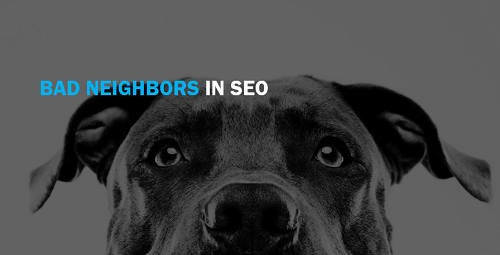What is a Bad Neighborhood in SEO?
A bad neighborhood in SEO consists of websites that have been downgraded by search engines either for being in violation of guidelines or contain certain language. Such websites usually appear far down in the search results or do not appear at all.
Most of these websites are known to webmasters as bad PPC (Porn, Pills and Casinos), and they contain terms such as “gambling”, “casino”, “pornography” and “Viagra.
Links coming from spammy or non-relevant sites or forums can also contribute as bad neighbors as they are seen by search engines as unnatural, deceptive and manipulative.

SEO Street Rules – What’s Right and What’s Wrong?
Being in a bad neighborhood can have a negative impact on your site’s position on search engine results. This is because search engines understand and rank sites by taking links into consideration, External links and backlinks tell them a lot about your site and the authority that they have.
Porn, pills and casinos are disliked the most by search engines because such sites have been and are still abused by spam. However, this does not mean that other areas of the web do not qualify as bad neighbors. In fact, some porn sites get their link juice from reputable sites such as the Huffington Post, Buzzfeed and others. This is why it is important to look at where you get links from and where you link to. Naturally linking to relevant websites does not cause any harm to your website.
Outbound Links
 Linking to authoritative sites that are in line with what you do tells search engines that your site is related to the site that you link to. This is why being associated with a good neighborhood makes you more likely to appear in related search results.
Linking to authoritative sites that are in line with what you do tells search engines that your site is related to the site that you link to. This is why being associated with a good neighborhood makes you more likely to appear in related search results.
However, before you can have a list of external links to different pages it is important that you have enough supporting content. There is no exact rule of thumb set by search engines, however, experts advise that having at least 250 per outbound link gives you a good chance of being indexed.
You also want to have links to sites that benefit your web visitors such as sites that tackle the same topics as you, or link to a sister publication. However, remember to avoid excessive cross-linking as it might have your site penalized.
Having too many links like a resource page can also devalue each one of them. So, always keep them minimal and avoid linking to competitors.
Inbound Links
Search engines dislike link schemes, including webmasters that pay money or exchange other goods or services for links. Usually, a website that sells links is more likely to be selling to a few other sites, and the same sites are more likely to be buying links from other sites and therefore creating some sort of network.
Blog comments are also another popular way of link building in SEO, however, if these come from old, unrelated or spammy blogs the link is as good as dead.
You also don’t want to have your link within a forum which is filled with poor content or a resource page. More so, having your site links spammed across forums could have you reported by users and penalized by the platforms or search engines.
How to Check your Link Neighborhood
 To ensure that you are not in violation of search engine guidelines, it is important to check your site’s neighborhood status every now and then. Google provides webmasters with a free tool to check unnatural links coming to and from your site on Search Console.
To ensure that you are not in violation of search engine guidelines, it is important to check your site’s neighborhood status every now and then. Google provides webmasters with a free tool to check unnatural links coming to and from your site on Search Console.
You can do so by following these quick and easy steps:
- Setup or login to your Search Console account.
- Select ‘Manual Actions’ on the left side of the menu.
- Google will list if you have any issues, and if you don’t the tool will return a “No Issues Detected” message as follows:
- On the “Links” option that follows, you can check where your external links are coming from, as well as the top linking sites and anchor texts used.
- If there are any backlinks that you do not approve of, you can always report them using the Google Disavow Link.
How to Avoid Being a Bad Neighbor – Google Guidelines
For every webmaster, it is important to understand what kind of links and content have an impact on your rankings. In this instance, the Google Webmaster Guidelines forbid the following:
- Using hidden texts or links,
- Loading pages with irrelevant keywords (irrelevant anchor links)
- Abusing structured data markup (schema)
- Sneaky redirects
- Having pages with little or no original content
- Participating in link schemes
- Doorway pages – e.g. pages targeted to specific regions while funneling to the same page.
- Participating in affiliate programs without adding sufficient value.
The full guidelines are accessible from the Google website.
Final Thoughts
Being in a bad neighborhood in SEO can have a huge impact on your rankings. So, checking where your links are coming from and where you link to is very important when it comes to link building. The best strategy is to shy away from black hat SEO and take note of the guidelines that Google has in place.
Download our presentation on Bad Neighbourhood in SEO.


